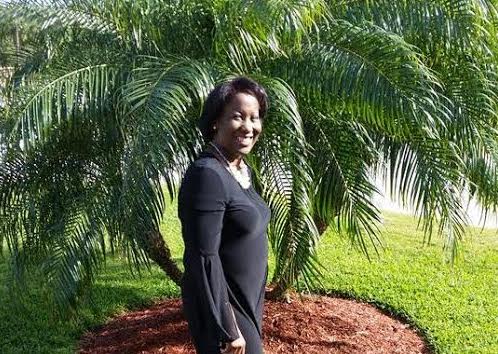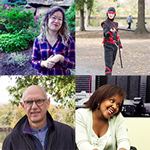Faces Behind the Screen: Cecilia James
Quick Links
<< Return to all “Faces Behind the Screen” stories
Part 1
I grew up in the beautiful spice island of Grenada in the Caribbean. I had a normal, and wonderful life. I did not grow up in a D/deaf community or a community with hard-of-hearing individuals. Even though I always talked with a lisp, my parents were unaware that I was single-sided deaf. It wasn’t until I migrated to the US after I completed high school that I was told that I was single-sided deaf and hard of hearing in my other ear.
A visit to Toronto, Canada alerted my parents to take me to an audiologist due to observation by family members there. My Aunt Cis was my Point of Light and still is today. She had my best interest at heart and was the person who recognized my hearing loss. What followed was a lengthy discussion with my Otolaryngologist (ENT) specialist, and I realized that my condition is detrimental without early intervention and detection.
As I become more and more educated in the deaf and hard-of-hearing community, the more I wish I had choices. There are times when I do not feel like I am a part of the hearing community because I’ve been stigmatized, humiliated, and have experienced discrimination in one of my previous employment. I wished I had choices like learning sign language and knowing all my legal rights.
As I followed my dreams, I encountered many obstacles where I was perceived as differently-abled. Thanks to my parents, and the values they instilled in me, I was able to deal with my differences which gave me an opportunity to continue to discover my identity, strengths, and personal growth.
“Thanks to my parents, and the values they instilled in me, I was able to deal with my differences which gave me an opportunity to continue to discover my identity, strengths, and personal growth.”
In America, we have the Disability Act which protects the rights of individuals with hearing loss. We also have d/Deaf and hard-of-hearing awareness resources, mandatory hearing screenings at birth and schools for the deaf. The schools for the deaf are equipped with language-rich, student-centered learning environments through America Sign Language (ASL) and English for the purpose of empowering students to live independent, fulfilling lives and to become productive contributing members of society. With an optimal English/ASL bilingual environment, students develop strong language and literacy foundation so they can thrive and become successful wherever they go in life. I will like to see more of these resources available globally.
There are parents of d/Deaf and hard-of-hearing children who are unaware of the tools that are accessible to them which makes it more difficult for a parent and child to be able to communicate. It’s very important for parents and siblings to learn sign language if their deaf child uses it as their primary means of communication. The key thing for parents to remember is their child’s happiness, which means overcoming the communication barrier and preventing their child from being isolated. A communication gap between hearing parents and deaf children has been known to harm both familial relations and academic progress.
That’s why I started my nonprofit, I Hear You, Inc.
Through my non-profit, I’m currently working with the Starkey Hearing Foundation in the USA, the Ministry of Health and Ministry of Education in Grenada, Carriacou, and Petite Martinique, to plan the logistics for a hearing mission in 2019 to Grenada. I wanted to start with Grenada because of my experience and willingness to give back and share my knowledge, and most of all to simply bring the gift of hearing to Grenada.
In addition, I am currently working on equipping the hospitals with an ERO•SCAN to screen babies after birth prior to being discharged from the hospital since there are no mandated annual hearing screenings for infants after birth or prior to attending schools. This is common among many developing countries.
With my passion and dedication, I will deliver these resources with the partnership of Starkey Hearing Foundation, the Ministry of Health, the Ministry of Education, along with the help of all stakeholders including businesses in the community. I plan to expand this journey throughout the Caribbean.
I Hear You inc.’s mission aims to bring about positive and high-impact change on every level to break down the barriers. We will assist and support both children and their families with direct action, assistive technology, and educational awareness needed for the children to achieve success. In addition, the gift of hearing, speech, and sight give children equal opportunities and improves the quality of life.
Part 2
Immediately after my diagnosis, I went on several interviews and was unsuccessful in finding employment. I decided to utilize a job agency where I explained to the recruiter that I was having difficulties finding work because of my accent. The recruiter responded, “This is not an accent. This is a speech deformity. It’s not an accent.”
I felt horrible at that moment and realized that I was in denial. Understanding the complexity and how undetected hearing loss can have a devastating impact on language development and speech. It was quite a challenge in the corporate world for me. I have encountered many difficulties, but I managed to survive the challenges that I faced in the corporate world. The challenges could have been avoided had early identification and intervention been possible. However, I am thankful that I can now share these lessons, which can be instrumental in the life of others through my work and dedication.
Currently, I work in the public sector, and I must say I am happy overall. No more humiliation, no more asking why I am educating myself when I attended school to complete my MBA or why am I applying for managerial jobs. No more crying myself to sleep at night because I did not want to go to work as I fear that my day was going to be worse than the day before. I am still traumatized over the ill-treatment I encountered. The idea to resign came up quite often. However, I envision that this was common practice in every workplace hence the reason I never left. Unfortunately, I was not aware of The Americans with Disabilities Act (ADA) which makes it illegal to discriminate against people with disabilities, including the d/Deaf and people who are hard of hearing (Deaf/HH).
The policy in relations to discrimination is heavily enforced in the public sector. In fact, every employee is treated with dignity and respect. It feels like a family and everyone embraces each other. Never once have I felt any different from my peers. The culture and experience are quite authentic, and the journey is rewarding.
I believe that sharing knowledge, experience, and time are powerful tools for generating positive change in society. In my current job, I had the opportunity to establish a couple of programs that continue to benefit the deaf and hard of hearing communities across the country. I later decided to spend time doing research and studies about the deaf and hard of hearing culture and community. I wanted to be a game changer. I accepted the fact that this journey was in no way by accident. It is my calling to be the point of light for children and their parents. I want to make it possible for children to get early hearing loss detection, so they can get the appropriate intervention to avoid what I was forced to contend with. My wish is for children to have the opportunity to grow up being proud of who they are, achieve their goals, aim for the sky and be productive citizens in their society just like their peers. If I can prevent what I faced as an adult, it will mend my heart to know that I can help one child at a time.
Part 3
Even though I was diagnosed and recommended to an audiologist to get fitted for hearing aids, I only wore my hearing aid once or twice. Of course, not only was I in denial for a couple of decades, but the hearing aid seemed useless. I continued lip reading and I would also turn towards my hearing ear when I was having a conversation with others.
I was unaware of how many sounds I never heard growing up as a child and even in my early adult life. I missed the sound of the calm waves on the beach and the roaring, gushing river near my home during a major storm. It wasn’t until I got a set of digital Phonak hearing aids that I became aware of how many sounds I missed.
[Thanks to my Phonak hearing aids], I was able to hear clearly the conversations held in front of my cubicle. For 8 years I was always aware of the presence of my coworkers whenever they gather around having a conversation but I was never able to articulate what they were saying until the morning [after receiving my Phonak aids].As I sat at my desk for the first time with the digital hearing aids, I became emotional as I realized how much I missed. It felt like I was getting to know myself. This journey continues to be a learning one. It’s made a difference with my hearing, and with me wanting to use my hearing aids.
My biggest takeaways thus far during my journey, experience, and studies are:
- Early Hearing Detection and Intervention (EHDI) is highly important. This refers to the practice of screening every newborn for hearing loss prior to hospital discharge. Infants who do not pass the screening should receive diagnostic evaluation and have access to early intervention programs. Hearing is essential to the development of a child’s speech and language skills. With the proper intervention, most children with hearing loss can overcome common obstacles and realize their full academic and social potential.
- Most of our hearing is done in the brain and not with our ears, therefore it is significant to consistently expose the brain to sound using hearing aids. As one hears more amplified sounds they build a tolerance to the louder volume levels of sound which helps the amplified sounds seem more natural. More exposure leads to optimal performance with hearing aids.
- There is a need for awareness in the corporate world. Companies should add training for managers and with have someone on the team who is proficient in equality, diversity, and inclusion.
- There is also an urgent need to leverage awareness through the media across the board. This can be a great informational and educational topic for discussion.
- Individuals who are d/Deaf, deafblind, and hard of hearing can do anything their hearing peers can do.
- Technology is bridging the gap between hearing individuals, and d/Deaf, deafblind and hard of hearing individuals.
- Many parents are not aware that it is necessary to advocate for their child/children, and if their child is d/Deaf it is also crucial that the family learns sign language to avoid communication barriers. Video Relay Services are also vital in the home. Children should never feel isolated or unable to effectively communicate at home.
- Sign Language is not another form of English. It is an official language with its own grammar, context and rules.
—
Faces Behind the Screen would like to thank Cecilia James for participating in our storytelling project. If you’re interested in sharing your story with us, fill out our nomination form.
Faces Behind the Screen is a storytelling project focusing on members of the Deaf and hard of hearing community.






